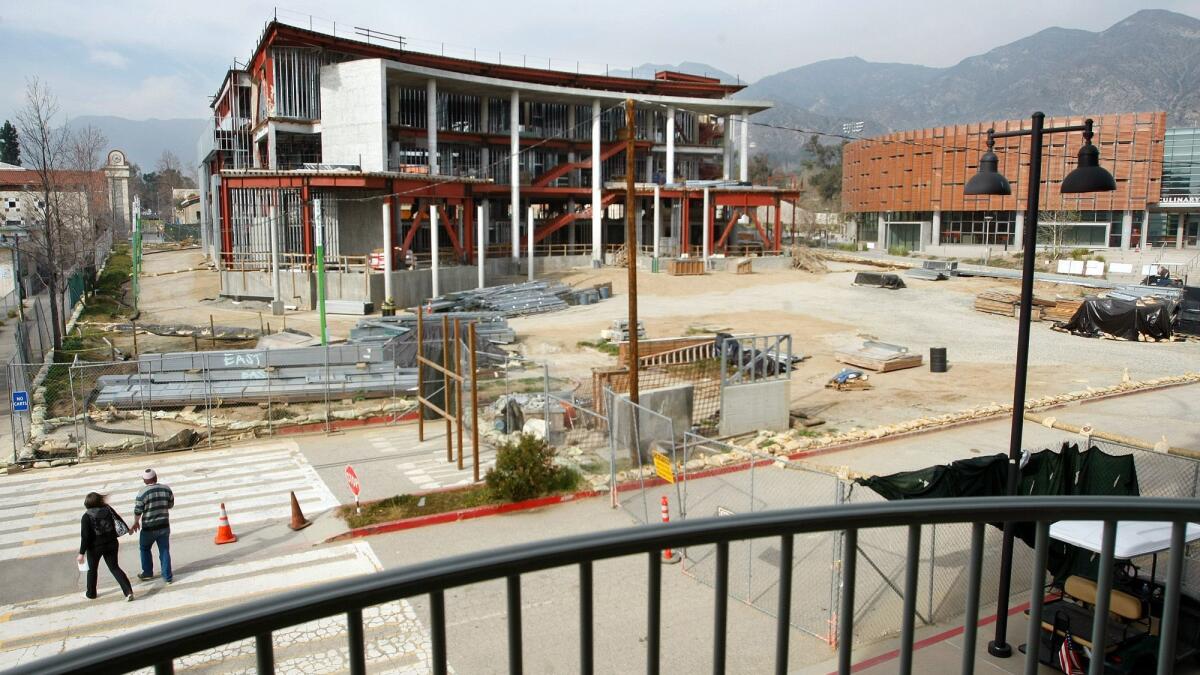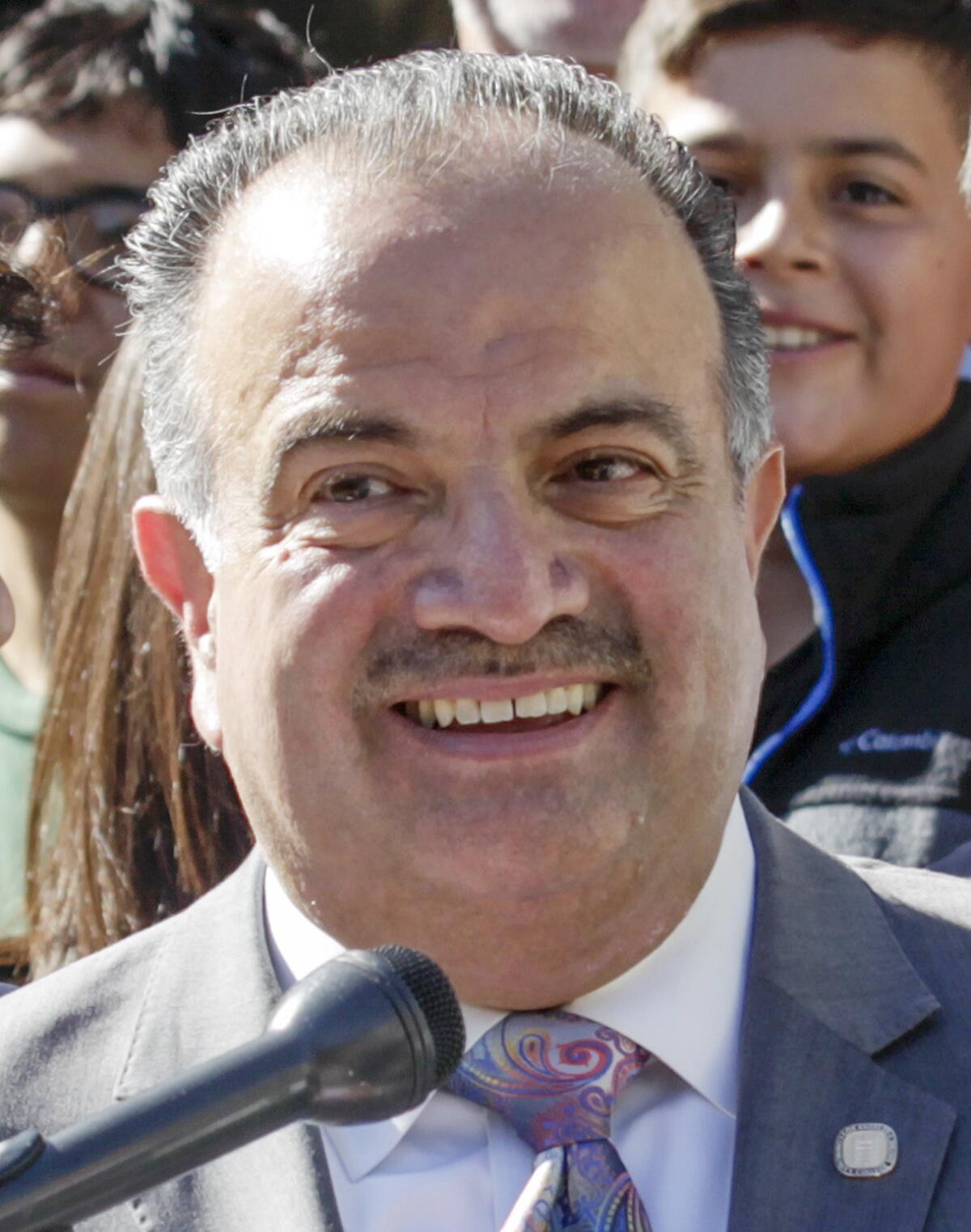L.A. Community College hit with whistleblower complaint over construction bond program

Nearly two years ago, David Salazar arrived at the Los Angeles Community College District, ready to oversee a massive $3.3-billion construction bond program that voters had approved for the largest two-year college system in the nation.
The new chief facilities executive was equipped with two master’s degrees and three decades of experience managing building projects for the California State University, Claremont Graduate University and the San Bernardino Community College District. But nothing prepared him for what he said he found in the L.A. college district — sloppy management, fierce backroom politics and entrenched relationships between board trustees and construction interests.
After Salazar raised red flags about cost overruns earlier this year, drawing sharp criticism from some trustees, the L.A. district’s chancellor, Francisco Rodriguez, gave him a notice of termination in March.
Now Salazar has filed a whistleblower complaint with the district, alleging Rodriguez fired him in retaliation for publicly outing problems in the construction program, The Times has learned.
Salazar, who is currently on paid administrative leave, is asking for full reinstatement or $1.6 million to cover five years of pay and benefits.

“I believe that I was retaliated against for bringing to the forefront that the bond program had not been managed efficiently, nor in the best interests of the students we serve,” Salazar told The Times. “I was becoming a threat to too many people and they wanted me to be gone.”
His complaint alleges that Rodriguez, General Counsel Jeffrey Prieto and trustees Steven Veres, Gabriel Buelna and Andra Hoffman retaliated against him.
The college district does not publicly respond to specific allegations in whistleblower complaints, spokesman William Boyer said in a statement. But he said that “all complaints are treated with the utmost seriousness and are thoroughly reviewed. Any claims that are substantiated will be pursued accordingly.”
Boyer added that the district “is a staunch custodian of taxpayer money entrusted to the district through its BuildLACCD capital improvement construction and bond programs. The district has taken numerous steps with appropriate reviews and checks to ensure all expenditures are accurate and within the limits of policies and contracts … including the hiring of an independent bond monitor, Exiger.”
The L.A. college district, which educates 230,000 students on nine campuses, has been embroiled in controversy over its construction program in the past. In 2011, The Times documented massive financial waste, nepotism and mismanagement in several district projects funded with bond measures. Rodriguez has said that reforms launched since then, including the independent bond monitor, have prevented boondoggles from recurring.
In his complaint, Salazar said the friction with some district officials and trustees began about November 2017, a few months into his tenure, over hiring for the multibillion-dollar construction bond program. Tensions deepened after district officials began to debate whether to change the way they staff and manage the program.
Under the current model, the district awards contracts to multiple firms to manage construction work at each campus. An alternative model would have reduced the number of firms selected.
Salazar originally proposed the alternative as more efficient. But he changed his mind and recommended staying with the status quo, which the board voted to do in December.
Salazar said he changed his mind because he began to fear switching would cause disruption, squeeze out smaller firms and set the foundation for a “pay-to-play scenario,” with the potential for trustees to promise work to particular firms in exchange for campaign contributions.
Veres disputed Salazar’s allegations.
“Salazar is making a criminal accusation and that is an absolute insult,” he said in an email to The Times. “The only promise I make is to protect the public trust.”
No individual trustee has the power to guarantee work to anyone, Veres added, because contracts must be approved by a majority of the seven-member Board of Trustees. In the vast majority of votes taken, he said, trustees adopt staff recommendations.
Rodriguez cited fallout over the bond management debate for resulting in Salazar’s getting an unsatisfactory performance evaluation last year.
He ranked Salazar satisfactory in nine of 12 categories, including accomplishments, job knowledge, problem solving, initiative and creativity, and said he had “hit the ground running” in his job. But Rodriguez said Salazar’s leadership, communication and judgment fell short, resulting in “diminished confidence” in him among trustees and an overall evaluation of unsatisfactory.
In his complaint, Salazar also alleged that other actions riled some trustees and top administrators, leading to his termination. They included:
- His decision to commission a study on how campuses were using their space. The October 2018 study found that many classrooms, laboratories and offices on all of the campuses were unused much of the time — to a greater degree than the statewide community college average. The study also found that the district was spending $4.36 million annually to maintain the unused space. “The analysis concluded that the district did not need to build more facilities at the rate it had projected to justify voter approval of the Measure CC $3.3-billion dollar bond,” the complaint said, “meaning the taxpayers were misled.”
- Then, in January, Salazar told trustees that the manager of the bond program, Jacobs Project Management Co., had overspent its first-year budget by $1.8 million. Jacobs was not required to adjust its spending until the fourth year of its five-year contract with the district, but Salazar said he wanted to head off any potential problems and asked Jacobs for a corrective action plan. In a letter to Rodriguez, Jacobs agreed that the calculation was accurate but said it had spent less than the district had approved.
In his complaint, Salazar said a Times article in February about the overspending, excess campus space and other problems with the bond program cited in an independent audit provoked “great anger and hostility towards me” from the chancellor, some trustees and a Jacobs official.
On March 4, Rodriguez gave Salazar a 60-day notice of termination, effective July 1.
The district has asked its bond monitor to investigate the allegations. Salazar said he was concerned that the monitor, who reports to the chancellor and general counsel, would potentially be biased and has asked for an independent investigator.
Twitter: @TeresaWatanabe
More to Read
Sign up for Essential California
The most important California stories and recommendations in your inbox every morning.
You may occasionally receive promotional content from the Los Angeles Times.











